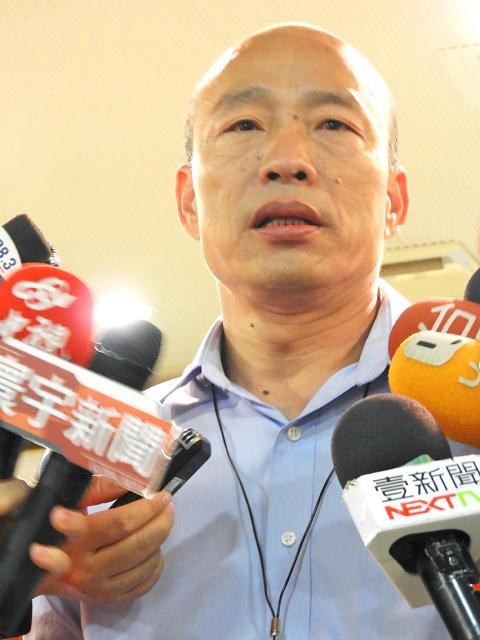Kaohsiung Mayor Han Kuo-yu (韓國瑜), who is vying for the Chinese Nationalist Party’s (KMT) presidential nomination, yesterday reiterated his opposition to a Taiwanese version of Beijing’s “one country, two systems” formula.
Han on Saturday at a rally in Yunlin County’s Douliou City (斗六) told supporters that “‘one country, two systems’ can never be implemented in Taiwan.”
“Taiwanese can never accept it, unless it is over my dead body,” he added, saying the phrase “over my dead body” in English.

Photo: Ge Yu-hao, Taipei Times
Han led the crowd in chanting “reject ‘one country, two systems’” and asked his supporters to have faith in him.
“If I am given the opportunity to lead the Republic of China [ROC] and become president ... I promise that ‘one country, two systems’ will never be carried out on the land of Taiwan,” Han said.
Han yesterday told reporters that his stance has not changed.
He said that in April when he was asked by Democratic Progressive Party (DPP) Kaohsiung City Councilor Lin Chih-hung (林智鴻) about the issue at a question-and-answer session at the Kaohsiung City Council, he said: “With my hand on my heart — I support the ROC and oppose ‘one country, two systems.’”
“My position has never changed. Some people have been trying to paint me with a red brush; I do not understand what they are thinking,” he said.
Han’s opponents have accused him of being pro-China and reluctant to criticize Beijing.
In March, he visited China’s liaison offices in Hong Kong and Macau while signing trade deals there, and politicians from the DPP and other parties accused him of supporting the “one country, two systems” framework.
“When have I ever said I would accept the ‘one country, two systems’ formula?” Han asked the crowd on Saturday. “It is impossible for Taiwanese to accept the ‘one country, two systems’ model used in Hong Kong and Macau. Absolutely impossible.”
Organizers estimated that more than 120,000 people attended the rally, while Yunlin police did not provide an estimate.
It was the third large rally to support Han’s presidential bid, following a gathering in Taipei on June 1 and another in Hualien on June 8.
Han is one of five people expected to participate in the KMT’s primary to choose a candidate for the presidential election in January next year.
The party plans to select its candidate based on the results of public opinion polls, which are to be conducted by five polling firms from July 8 to 14.
The results are to be announced on July 15.
Additional reporting by Ge Yu-hao

Taiwanese can file complaints with the Tourism Administration to report travel agencies if their activities caused termination of a person’s citizenship, Mainland Affairs Council Minister Chiu Chui-cheng (邱垂正) said yesterday, after a podcaster highlighted a case in which a person’s citizenship was canceled for receiving a single-use Chinese passport to enter Russia. The council is aware of incidents in which people who signed up through Chinese travel agencies for tours of Russia were told they could obtain Russian visas and fast-track border clearance, Chiu told reporters on the sidelines of an event in Taipei. However, the travel agencies actually applied

Japanese footwear brand Onitsuka Tiger today issued a public apology and said it has suspended an employee amid allegations that the staff member discriminated against a Vietnamese customer at its Taipei 101 store. Posting on the social media platform Threads yesterday, a user said that an employee at the store said that “those shoes are very expensive” when her friend, who is a migrant worker from Vietnam, asked for assistance. The employee then ignored her until she asked again, to which she replied: "We don't have a size 37." The post had amassed nearly 26,000 likes and 916 comments as of this

New measures aimed at making Taiwan more attractive to foreign professionals came into effect this month, the National Development Council said yesterday. Among the changes, international students at Taiwanese universities would be able to work in Taiwan without a work permit in the two years after they graduate, explainer materials provided by the council said. In addition, foreign nationals who graduated from one of the world’s top 200 universities within the past five years can also apply for a two-year open work permit. Previously, those graduates would have needed to apply for a work permit using point-based criteria or have a Taiwanese company

The Shilin District Prosecutors’ Office yesterday indicted two Taiwanese and issued a wanted notice for Pete Liu (劉作虎), founder of Shenzhen-based smartphone manufacturer OnePlus Technology Co (萬普拉斯科技), for allegedly contravening the Act Governing Relations Between the People of the Taiwan Area and the Mainland Area (臺灣地區與大陸地區人民關係條例) by poaching 70 engineers in Taiwan. Liu allegedly traveled to Taiwan at the end of 2014 and met with a Taiwanese man surnamed Lin (林) to discuss establishing a mobile software research and development (R&D) team in Taiwan, prosecutors said. Without approval from the government, Lin, following Liu’s instructions, recruited more than 70 software